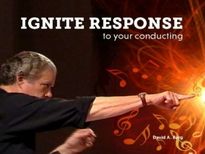Who is Igniting Response for?
Ignite Response - the approach and the book - can be of substantial musical and personal value to:
Early Career Teachers
Now that they know the importance of engaging their students (and that moving their arms doesn't do a whole lot): to help create the kind of inspiring music that led you and them to go into music education. (This especially important during the challenging first years of practice.)
Veteran Teachers, Mentors, Music Staff Professional Developers
So they can best support their student teachers, new teachers, and workshop participants with approaches that will engage today’s and tomorrow’s students for the demands for whose attention is enormous - and increasing.
Young Musicians
To create greater value in ensemble preparation, by understanding more about the science and art of conducting and how to be a good "ensemble citizen," as well as: learning to mark, watch, understand gestures, and how to learn, solve technical problems, and sing and play more expressively. There is also lots of information to add to your individual singing and playing tremendously.
Music Education Majors & Student Teachers
To help you learn how to engage to engage the young musicians pay attention to you and make music with you. PS: it’s not your lovely beat patterns, independent left-hand gestures, or knowledge of transposition! And they’re not likely to pay attention “because they should.” …at least not for long, if you can’t engage them.
Instrumentalists & Singers Who Are - or Will be - Conducting
This book provides you with what you need to know to engage and involve your students… whether or not your beat is pristine or you know every note in the score. While these things are central when conducting conservatory and professional musicians, creating engagement comes first when working with most ensembles.
Professors of Music Education
To provide students with a research- and practice-based pedagogy in a learner-centered, constructivist context for leading student ensembles. This tested approach will help you to help them engage and involve future students who will face increasing competition for their time, attention, and energy. Your future teachers will learn how to keep attendance, morale, and numbers high, and be able to create personally gratifying musical experiences in the challenging first few years of practice, when administrative tasks can be so overwhelming and dispiriting.
Administrators & Supervisors
To provide a guide for what to look for in an observation, rehearsal, or concert…as well as concrete, specific, proven approaches for improvement.
Parents of Musicians
So you can understand how to best support your child's ensemble participation, and learn even more how valuable that experience is - and will prove - to his/her emotional and psychological development.
Music Education & Arts Education Organizations
To strengthen professional development offerings for members and Teaching Artists.
Professional Orchestras
To help education programs support the success of school ensembles in this context: The Knight Report found that a significant percentage of subscribers and annual fund contributors to orchestras participated, as students, in school music ensembles.
Early Career Teachers
Now that they know the importance of engaging their students (and that moving their arms doesn't do a whole lot): to help create the kind of inspiring music that led you and them to go into music education. (This especially important during the challenging first years of practice.)
Veteran Teachers, Mentors, Music Staff Professional Developers
So they can best support their student teachers, new teachers, and workshop participants with approaches that will engage today’s and tomorrow’s students for the demands for whose attention is enormous - and increasing.
Young Musicians
To create greater value in ensemble preparation, by understanding more about the science and art of conducting and how to be a good "ensemble citizen," as well as: learning to mark, watch, understand gestures, and how to learn, solve technical problems, and sing and play more expressively. There is also lots of information to add to your individual singing and playing tremendously.
Music Education Majors & Student Teachers
To help you learn how to engage to engage the young musicians pay attention to you and make music with you. PS: it’s not your lovely beat patterns, independent left-hand gestures, or knowledge of transposition! And they’re not likely to pay attention “because they should.” …at least not for long, if you can’t engage them.
Instrumentalists & Singers Who Are - or Will be - Conducting
This book provides you with what you need to know to engage and involve your students… whether or not your beat is pristine or you know every note in the score. While these things are central when conducting conservatory and professional musicians, creating engagement comes first when working with most ensembles.
Professors of Music Education
To provide students with a research- and practice-based pedagogy in a learner-centered, constructivist context for leading student ensembles. This tested approach will help you to help them engage and involve future students who will face increasing competition for their time, attention, and energy. Your future teachers will learn how to keep attendance, morale, and numbers high, and be able to create personally gratifying musical experiences in the challenging first few years of practice, when administrative tasks can be so overwhelming and dispiriting.
Administrators & Supervisors
To provide a guide for what to look for in an observation, rehearsal, or concert…as well as concrete, specific, proven approaches for improvement.
Parents of Musicians
So you can understand how to best support your child's ensemble participation, and learn even more how valuable that experience is - and will prove - to his/her emotional and psychological development.
Music Education & Arts Education Organizations
To strengthen professional development offerings for members and Teaching Artists.
Professional Orchestras
To help education programs support the success of school ensembles in this context: The Knight Report found that a significant percentage of subscribers and annual fund contributors to orchestras participated, as students, in school music ensembles.

